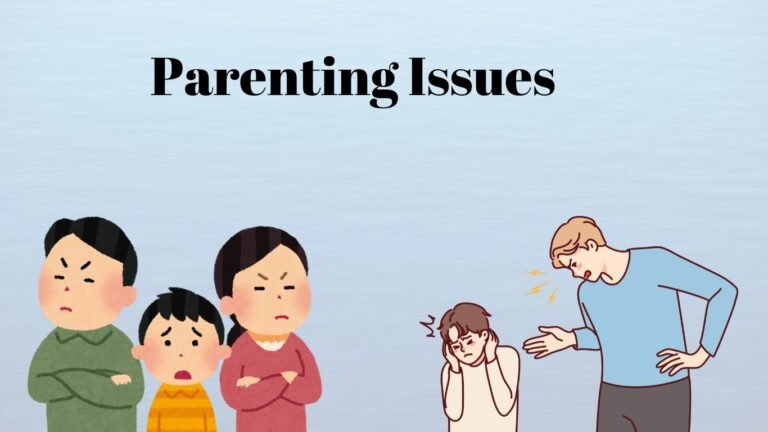
Parenting Issues: Overcoming Challenges and Strengthening Family Bonds
Parenting is, arguably, one of life’s most rewarding responsibilities, however it can also arguably be challenging (Bornstein, 2002).
From managing children’s outbursts to balancing parenting roles within co-parenting, the journey of parenting can often make you feel unprepared, or experience overwhelm (American Academy of Pediatrics, 2014)
However, understanding common parenting issues and learning effective strategies to address them can make a significant difference in fostering a more peaceful, supportive home environment (Cowan and Cowan, 2002).
This article is for educational and informational purposes only. Please see full disclaimer below.
What Are Parenting Issues?
Parenting issues include a wide variety of struggles and obstacles which parents can face while raising their children. These challenges can stem from a number of root causes; for example, behavioural changes, or problematic behaviour, can occur during developmental shifts such as adolescence or growth spurts, but may not always stem from hormonal changes typical of puberty (Bornstein, 2002).
For example, external stressors such as family financial issues or relationship difficulties between parents can also correlate with behavioural difficulties (American Academy of Pediatrics, 2014). Also, when the behaviour of children challenges parental expectations, this can lead to disappointment (Cowan and Cowan, 2002) and a crisis of parental expectations.
Recognising and addressing these parenting issues early can promote healthier family dynamics and foster stronger emotional bonds (Bornstein, 2002).
Common Parenting Issues and Practical Solutions
Child Behavioral Problems
Defiance, tantrums and aggression are common childhood behavioural struggles, although parents may find these behaviours to be particularly perplexing (American Academy of Pediatrics, 2014) when their child expresses these behaviours in their early years.
Sometimes, parents can find themselves feeling frustrated or even powerless when their children behave in this manner. There are, however, a number of practical solutions for parents to promote good behaviour from their children, some of which include:
- Promoting positive discipline (Cowan and Cowan, 2002) by establishing rewards to encourage good behaviour, as well as reasonable consequences to deter poor behavior
- Setting clear, consistent rules and boundaries to establish expectations (Bornstein, 2002).
- Communicating with your children with empathy, helping your child to express their emotions instead of acting out, and guiding them to voice their emotions in healthier ways (American Academy of Pediatrics, 2014)
Parent-Child Relationship Strains
Emotional disconnection and miscommunication can weaken the relationship between parents and children; over time, this widening gap between parents and children can weaken trust (Bornstein, 2002), and lessen the familial sense of closeness.
There are a number of solutions which can be implemented to strengthen the parent-child relationship:
- Active listening: paying attention to your child’s feelings and concerns.
- Quality time: spending dedicated time together to build stronger bonds.
- Therapeutic support: seeking counseling to resolve deeper relationship issues.
3. Co-Parenting Conflicts
Parenting disagreements between couples or separated parents can lead to inconsistent rules and added stress (Cowan and Cowan, 2002). There are a number of tips which couples or separated co-parents can, however, implement in this regard:
- Open communication, discussing parenting goals and expectations (American Academy of Pediatrics, 20140.
- Compromise and flexibility, finding a middle ground for consistency in parenting styles (Bornstein, 2002).
- Mediation or therapy, considering professional counseling in order to manage disputes peacefully (Cowan and Cowan, 2002).
4. Parental Stress and Burnout
The pressure of balancing work, household responsibilities, and childcare often leaves parents feeling emotionally drained (Bornstein, 2002). However, parents can implement the following actionable strategies in order to manage these responsibilities without burnout:
- Self-care practices, making time for relaxation, hobbies, and personal growth (American Academy of Pediatrics, 2014)
- Time management, prioritising tasks and delegating responsibilities (Bornstein, 2002)
- Therapeutic support, seeking help from parenting therapists to learn stress management techniques (Cowan and Cowan, 2002).
5. Adolescent Challenges
Parenting teenagers can be particularly difficult (American Academy of Pediatrics, 2014) due to mood swings, rebellion, and peer pressure. There are a number of solutions, however, to these challenges:
- Understanding developmental changes, by educating yourself about teenage behavior (Bornstein, 2002)
- Encourage open conversations, discussing topics such as relationships, mental health, and peer pressure openly (Cowan and Cowan, 2002)
- Set boundaries, creating rules that promote and foster independence (American Academy of Pediatrics, 2014) while maintaining respect.
How can Parenting Therapy Help?
It’s natural to feel unsure about whether parenting therapy is necessary. However, seeking professional support can be highly beneficial if you experience:
- Frequent arguments or tension within the family.
- Feelings of helplessness or frustration regarding your child’s behavior.
- Emotional burnout or anxiety about parenting responsibilities.
- Difficulty managing co-parenting disagreements.
Therapists offer expert insights and practical solutions (Bornstein, 2002) to help parents regain confidence and strengthen their families.
Parenting therapy provides structured guidance and emotional support for parents facing these challenges (Cowan and Cowan, 2002; American Academy of Pediatrics, 2014; Bornstein, 2002). Parenting therapy supports parents to:
- Improve their communication skills, fostering deeper connections with children.
- Implement positive discipline, establishing boundaries without harming self-esteem.
- Manage stress effectively, teaching effective coping techniques to reduce burnout.
- Resolve conflicts, by mediating co-parenting disagreements effectively for consistency.
- Tailor strategies to family needs, receiving personalised advice based on unique family and relationship dynamics.
Parenting issues are a normal part of raising children, but they don’t have to overwhelm you. With the right tools, strategies, and support, parents can address challenges effectively and create positive family relationships.
If you’re struggling with parenting concerns, consider parenting therapy as a proactive step toward improving communication, resolving conflicts, and managing stress.
Conclusion:
Although parenting is one of life’s most rewarding responsibilities, it can come with its fair share of challenges.
From managing children’s behavioral problems, to navigating co-parenting conflicts and parental burnout, recognising these parenting issues early and employing practical solutions, including structured parenting therapy, can foster a more peaceful and supportive home environment.
With effective communication, clear boundaries, and professional support, parents can thereby overcome these challenges and build stronger, more resilient family relationships.
FAQ:
Q: What are some common parenting issues?
A: Common parenting issues include child behavioral problems such as defiance, tantrums, and aggression; parent-child relationship strains due to miscommunication and emotional disconnection; co-parenting conflicts; parental stress and burnout; and challenges related to parenting adolescents (Bornstein, 2002; American Academy of Pediatrics, 2014).
Q: How can parents address child behavioral problems?
A: Parents can promote positive discipline by establishing rewards for good behaviour and reasonable consequences for poor behaviour, set clear and consistent rules, and communicate with empathy to help children express their emotions in healthier ways (Cowan and Cowan, 2002).
Q: What strategies can help with co-parenting conflicts?
A: Open communication, compromise, flexibility, and seeking mediation or professional counseling can help manage and resolve co-parenting disagreements (American Academy of Pediatrics, 2014).
Q: When should parents consider seeking therapy?
A: Therapy is advisable when parents experience frequent arguments, feelings of helplessness, emotional burnout, or difficulties managing co-parenting disagreements (Cowan and Cowan, 2002).
Q: What benefits does parenting therapy offer?
A: Parenting therapy can improve communication, help implement positive discipline, reduce stress, resolve conflicts, and provide personalized strategies to meet the unique needs of a family (Bornstein, 2002).
References:
- American Academy of Pediatrics (2014) Caring for Your Baby and Young Child: Birth to Age 5, 6th ed. Elk Grove Village, IL: American Academy of Pediatrics.
- Bornstein, M.H. (2002) Handbook of Parenting: Volume 1: Children and Parenting. 2nd ed. Mahwah, NJ: Lawrence Erlbaum Associates.
- Cowan, P.A. and Cowan, C.P. (2002) Interparental Conflict and Child Development: Theory, Research, and Applications. New York: Guilford Press.
Disclaimer: The author, Sabbir Ahmed, is a registered psychotherapist (UKCP Reg: 2011164676). Sabbir has written this article for informational and educational purposes only, and referenced relevant sources when writing this article.
Reading this article, in and of itself, does not create a therapist–client relationship.
All content is provided on an “as is” basis; no guarantees are made as to its accuracy or completeness.
The information contained on Kind Soul Psych is for general information purposes only and does not purport to be, or constitute, medical and/or legal advice.




All Rights Reserved.

